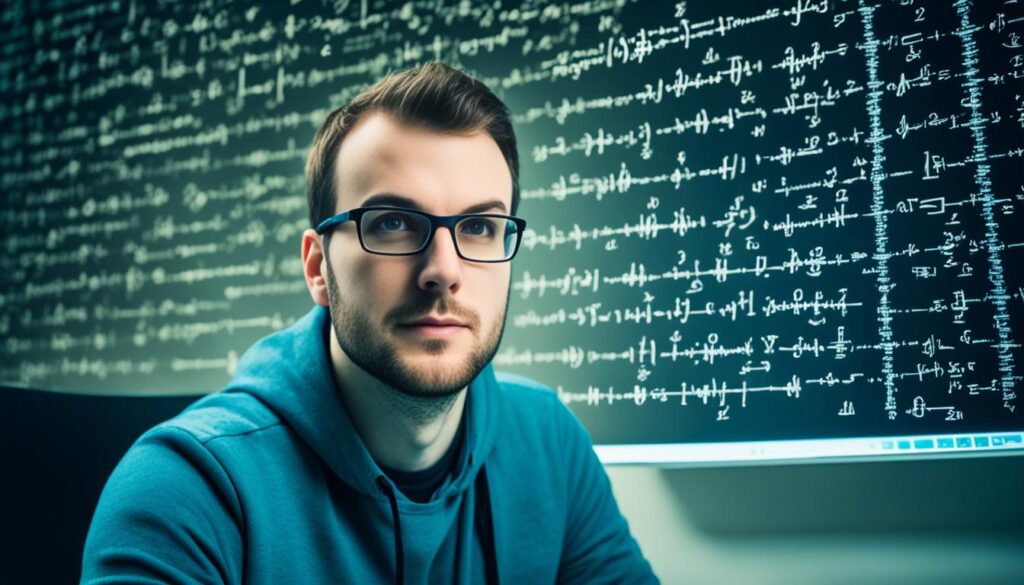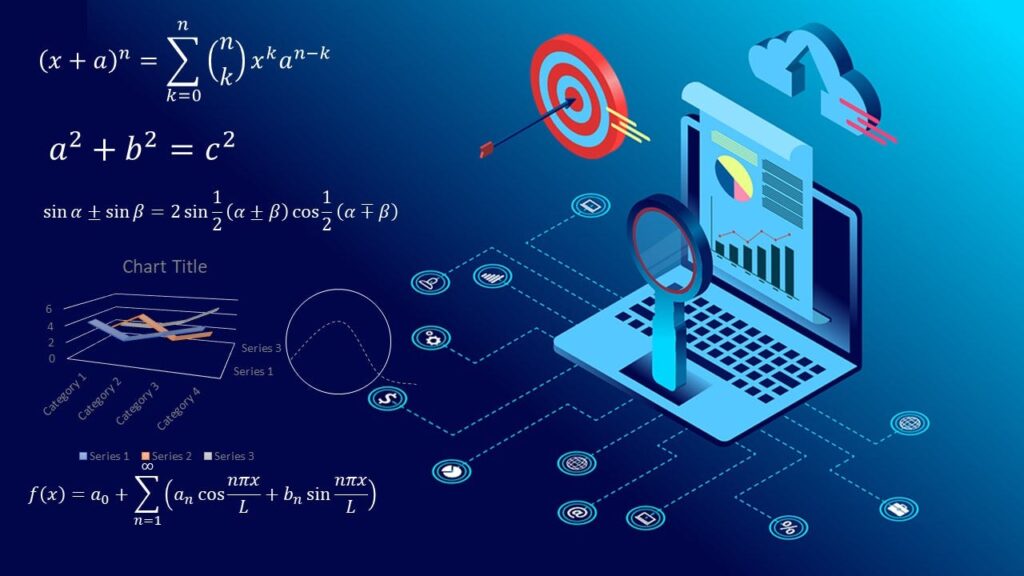Many of you know how closely math and computers are linked. Numbers are the foundation of what we enjoy, communicate, and access easily today. Logic and numbers work together in programming. Math is key for programmers to make complex apps. Without math skills, a programmer is limited.
So, it’s vital for programmers to grasp important math concepts. These are crucial for programming.

Key Takeaways
- Programming heavily depends on math, including coding logic, algorithms, and data structures.
- Understanding problem-solving and computational thinking, based on math, is a must for programmers.
- Math is crucial for software development, from simple coding to complex areas like data science and game development.
- Getting good at programming requires a strong math background, covering binary, Boolean algebra, linear algebra, and calculus.
- Being skilled in math helps programmers write efficient, scalable, and easy-to-maintain code.
Introduction to Programming and Mathematics
Math and computer programming are closely linked. Math is the base for many parts of computer science and programming. Knowing how math and computers work is key for becoming a good programmer.
Many college degrees in computer science and related fields need a strong math background. Courses like calculus, statistics, and linear algebra are often needed. This shows how important math is for programming.
Even though 90% of a programmer’s job doesn’t need advanced math, doing well in math helps with programming. Math majors often do great in coding bootcamps and make top programmers. They use math thinking, problem-solving, and algorithmic reasoning well in programming.
“Math is a prerequisite for college degrees in computer science, information technology, and related fields.”
In areas like Artificial Intelligence (AI) and Machine Learning (ML), knowing advanced math is a must. Concepts like linear algebra and calculus are key for complex algorithms and data structures in AI and ML.
Knowing math also helps in technical interviews. Many questions there are about data structures and algorithms, which rely on math.
In conclusion, while programmers may not always use advanced math daily, math and programming are closely tied. Math is the base for computer science, programming, and related fields. Being good at math can really boost your programming skills and problem-solving abilities.
The Role of Math in Basic Programming
Many think programming has nothing to do with math, but that’s not true. Math is at the heart of programming, from simple tasks to complex algorithms. It’s built on mathematical concepts like binary math and Boolean algebra.
Binary Mathematics and Boolean Algebra
Computers use the binary number system at their core. Every piece of data, like numbers or letters, is made up of 0s and 1s, or binary representation. Knowing binary math is key for programming at a low level and understanding how computers work.
Boolean algebra is also key in programming. It’s about the rules of logical operations. These rules help computers make decisions using AND, OR, and NOT operators. It’s vital for writing code that works well and is reliable.
- Binary representation: The foundation of digital computing
- Binary math: Essential for low-level programming and computer processing
- Boolean algebra: Vital for decision-making and logical operations in programming
Programmers often use standard arithmetic and algebra as they go deeper into programming. They also work with the hexadecimal number system. Hexadecimal is a base-16 system used for things like color, memory addresses, and setting up systems.
In short, math like binary, Boolean algebra, and standard arithmetic is key to programming. These concepts help developers build the digital world we use. Learning these basics is important for becoming a good programmer.
Math Concepts in Procedural and Scripting Languages
Programming languages like C++, C, Java, and Python need a basic math knowledge. Scripting languages like HTML, CSS, JavaScript, Node.js, PHP, and Ruby also require math skills. You don’t need a deep math background, but understanding pre-algebra, variables, and basic operations is helpful. This knowledge helps programmers think logically and develop important skills.
Programming languages use functions a lot. These functions are key parts that work like “computation abstraction” in big systems. They can be written in different styles and use math techniques like Taylor expansion and Fourier transformation to solve problems.
Even simple languages like PostScript and x86 Assembly can be useful for math tasks, like making figures or optimizing tasks. Other languages, like Octave, Haskell, Lisp, Fortran, and Forth, also have math interests but are used less often.
- Procedural languages like C++, C, Java, and Python require basic mathematical reasoning and computational thinking skills.
- Scripting languages such as PostScript and x86 Assembly can be useful in mathematical applications, despite their simplicity.
- Languages like Octave, Haskell, Lisp, Fortran, and Forth have varying levels of mathematical interest and usage, but their adoption may be more specialized.
| Programming Language | Mathematical Concepts and Applications |
|---|---|
| C++, C, Java, Python | Pre-algebra, variables, functions, basic operations |
| HTML, CSS, JavaScript, Node.js, PHP, Ruby | Pre-algebra, variables, functions, basic operations |
| PostScript | Mathematical figure creation, simple syntax |
| x86 Assembly | Optimization of specific tasks, simple execution model |
| Octave | Matrix-centric computation, similar to MATLAB |
| Haskell, Lisp, Fortran, Forth | Varying degrees of mathematical interest and usage |
“The best work is often implemented in PostScript, which has a simple and elegant syntax that is particularly well-suited for mathematical interests.”
Data Structures and Algorithms: Where Math Meets Programming
Programmers often stand at the crossroads of math and computer science. Data structures and algorithms are key areas where this blend is clear. They need a strong grasp of math, problem-solving skills, and how to reason through algorithms.
Complexity Analysis and Big O Notation
Knowing how fast an algorithm works is vital in programming. Complexity analysis and Big O notation help with this. These tools let programmers check if their code can deal with real-world tasks.
- Competitive coding often requires mathematical knowledge to solve problems efficiently.
- Algorithms like GCD, LCM, and the Euclidean Algorithm are based on math.
- Modulo arithmetic is used in programming for big calculations.
- The Extended Euclidean Algorithm finds the modular inverse of a number.
Knowing the math behind data structures and algorithms helps programmers write efficient code. This skill is key for solving tough programming problems and making apps that work well.
| Mathematical Concept | Application in Programming |
|---|---|
| Discrete Mathematics | Combinatorial optimization, algorithm design, and data structures |
| Statistics and Probability | Testing, quality assurance, algorithm analysis, and performance evaluation |
| Linear Algebra | Computer graphics, machine learning, and representing 3D entities |
Programming is always changing, making math skills more important. By combining math and computer science, programmers can improve their problem-solving, algorithmic thinking, and code efficiency.

Math in Advanced Programming Fields
Basic coding doesn’t need a lot of math, but advanced programming uses math a lot. Computer graphics and animation are two fields that use math a lot.
Computer Graphics and Animation
Computer graphics and animation use math a lot. They need to know about geometry and linear algebra. Programmers use linear algebra to make 2D and 3D models and for photo editing.
Differential equations help make software that simulates complex things like traffic or health conditions. Statistical concepts are used in many computer programs, from games to data analysis.
In short, fields like computer graphics and animation need a strong math background. They focus on geometry and linear algebra. This math is key for making cool and realistic computer graphics.
“Mathematics is not just about numbers and formulas; it’s a way of thinking that underpins many of the technological advancements we enjoy today. Programmers who embrace the relationship between math and coding can unlock a world of creative possibilities.”
Do Programmers Use Math?
Many think programming and math don’t mix, but they actually go hand in hand. The amount of math needed for programming varies, but the link between them is clear. Math skills are crucial for programmers. They help with solving problems, thinking algorithmically, and writing quality code.
At the core, computers use binary math and Boolean algebra. These ideas are key for programming at a low level and the logic behind modern software. Programming also needs basic math like adding, subtracting, multiplying, and dividing. These are used in many tasks, from financial work to simulations.
Fields like computer graphics, animation, and data science use more math too. Concepts like linear algebra, calculus, and statistics are used to solve complex problems. They help programmers make apps that work like real-life things.
It’s true not all programming needs high-level math. But knowing math well can really help programmers solve problems better. It lets them make algorithms more efficient, improve code, and create software that’s strong and reliable.
In the end, programming and math are closely connected. From simple math to complex ideas, using math thinking is a big plus for programmers. Whether you’re doing simple scripts or advanced apps, knowing programming and math well is key to your success.
“Programming is the art of translating mathematics into reality.” – Donald Knuth

Debugging and Testing: The Role of Math
In software development, debugging and testing are key to making sure apps work well and reliably. Math plays a big part in these tasks. It helps with checking data and fixing tough problems. Using math makes debugging and testing better for programmers.
Validating Data and Troubleshooting
Debugging means finding and fixing errors in software. It needs a good grasp of math. Math tools help programmers spot and fix problems by analyzing how a program works. This includes:
- Checking data for errors, outliers, missing values, and inconsistencies through data validation techniques.
- Employing statistical analysis to identify patterns and anomalies that may indicate underlying problems.
- Utilizing mathematical models to simulate and test the behavior of complex systems, enabling the detection and resolution of issues.
Troubleshooting also gets a boost from math. Programmers use math to analyze errors, check logs, and trace problems. Math helps in making algorithms run better and finding where they slow down.
| Techniques for Debugging Complex Mathematical Models | Benefits |
|---|---|
| Validating models with small data sets | Helps isolate errors and improve model readability |
| Debugging constraints and considering past data | Aids in identifying and resolving issues in mathematical models |
| Simplifying mathematical models | Reduces complexity, scope, and size, making debugging easier |
| Leveraging debugging tools | Facilitates monitoring and fixing errors in model code and results |
Using math in debugging and testing makes software better and more reliable. This leads to apps that work well for users.
Math in Specialized Programming Fields
Data Science and Machine Learning
Programmers moving into specialized coding need to know more math. Data science and machine learning are two areas closely linked to math. They use math like statistics, linear algebra, and calculus to understand and predict from big data.
Data science uses stats to find patterns in complex data. Machine learning makes computers learn and get better on their own without needing to be told how. Both fields need strong math skills for making good algorithms and tools.
| Specialized Programming Field | Relevant Mathematical Concepts |
|---|---|
| Data Science | Statistics, Probability, Regression Analysis, Optimization |
| Machine Learning | Linear Algebra, Calculus, Optimization, Probability, Statistics |
Experts in these fields must know math well to make algorithms, predict outcomes, and make smart decisions. Using math right is key for doing well in data science and machine learning.
“The best mathematicians are those who think on their feet, are able to rearrange concepts and manipulate symbolic representations in their mind. These are precisely the skills that make for great programmers.”
Mathematics in Finance and Economics Programming
Coding for finance and economics programming uses key math concepts like linear algebra, calculus, and more. These tools help in making financial models and analyzing things like stock prices and interest rates. They also help in optimizing portfolios and managing risks well.
Developers in finance and economics use linear algebra to work with complex financial data. Calculus helps them predict how algorithms will work, optimize resources, and make software run better. Probability and statistics are key for understanding risks, optimizing portfolios, and analyzing financial data over time.
| Mathematical Concept | Applications in Finance and Economics Programming |
|---|---|
| Linear Algebra | Modeling financial data structures, asset correlations, and covariance matrices |
| Calculus | Predicting algorithm behavior, optimizing resource allocation, and enhancing software performance |
| Probability and Statistics | Risk assessment, portfolio optimization, and analysis of financial time series data |
| Optimization Techniques | Finding optimal solutions for financial decision-making and resource allocation |
| Numerical Methods | Developing and simulating complex financial models and algorithms |
These math concepts help developers make advanced financial apps. They can analyze market trends, manage risks, and improve investment strategies. By using math, finance and economics programmers create software that meets the financial industry’s needs.
Game Development and Mathematics
Game development and mathematics go hand in hand. They use math to make games feel real and fun. Programmers use math to make virtual worlds come alive.
Graph Theory, Probability, and Optimization
Graph theory is key in game development. It helps make characters move around the game world well. Probability makes games unpredictable, like random enemy attacks or finding power-ups.
Math also helps make games run well on different computers. Developers use math to balance game quality, fun, and speed. This makes games better for players.
| Mathematical Concept | Application in Game Development |
|---|---|
| Graph Theory | Pathfinding and navigation |
| Probability and Statistics | Random element generation (enemies, weapons, power-ups) |
| Optimization | Performance optimization and balancing |
Math makes game development grow and innovate. As games get more complex, math skills will be more important. This will help make games more real and fun.
“Game development is not just about coding; it’s about using mathematics to bring virtual worlds to life.”
The Future of Programming and Mathematics
The world of technology is changing fast, making math more important in programming. New areas like artificial intelligence, machine learning, quantum computing, and more need strong math skills. Programmers with a good math background will do well in the future.
These new tech areas need deep math knowledge for new solutions. Programmers who mix coding with math will lead in the tech world.
Math skills are key in web development, programming, and making apps. Game developers need to know linear algebra, calculus, and more for complex games. AI and machine learning developers must know advanced math for their work.
| Programming Field | Mathematical Skills Required |
|---|---|
| Front-End Web Development | Basic algebra, geometry, formulas, variables |
| Back-End Web Development | Algebra, geometry, trigonometry, calculus |
| Mobile App Development | Basic math skills, focus on problem-solving |
| Game Development | Linear algebra, calculus, geometry, trigonometry, statistics |
| AI/ML Development | Linear algebra, calculus, statistics |
Math skills aren’t needed for all programming jobs, but they help a lot. Programmers who mix coding with math will shape the tech future.
“The future of programming lies in the seamless integration of coding and mathematical proficiency.”
As tech grows, math knowledge for programmers will become more important. Both new and experienced programmers should work on their math skills. This will help them keep up and use the full potential of programming’s future.
Conclusion
Math is key in computer programming. It lays the groundwork for logic, problem-solving, and thinking like a computer. Even though different programming areas need different math skills, knowing basic math is a must for all programmers. As technology gets better, the need for programmers with strong programming skills and mathematical knowledge will keep growing. This makes it very important for new coders to get good at this.
The key takeaways from this talk on math in programming are clear. Math is at the heart of programming, from simple numbers to complex algorithms and data structures. Programmers with a strong math background and problem-solving skills will do well in their jobs. They can work in web development, game design, or artificial intelligence.
The need for programmers with strong mathematical knowledge will keep going up as programming changes. By combining math and coding, new programmers can set themselves up for success. They’ll open up new chances and help with the tech advances that change our digital world.
FAQ
Do programmers need to know math?
Yes, math is key in computer programming. Programmers must grasp mathematical concepts like binary math and standard arithmetic. These skills help in making complex software.
What specific math concepts are important for programming?
Important math concepts for programming include binary math and the hexadecimal system. Also, standard arithmetic, algebra, and statistics are crucial. Calculus, linear algebra, and graph theory are also vital.
Do programming languages require different math skills?
Yes, different programming languages need various math skills. For example, languages like C++ and Java require basic math knowledge. But, fields like data science and finance need more advanced math.
How does math help with problem-solving in programming?
Math boosts logical thinking and problem-solving in programming. It helps programmers express ideas abstractly and work with algorithms. This leads to better computational thinking and real-world solutions.
Is math a prerequisite for computer science degrees?
Yes, computer science degrees require math courses like statistics and calculus. These courses equip students with skills for complex programming and efficient algorithms.
How important is math for debugging and testing in programming?
Math is vital for debugging and testing. It helps programmers analyze program behavior and improve performance. Mathematical techniques are key for troubleshooting software.
What is the future of programming and mathematics?
The role of math in programming will grow as technology advances. Areas like AI and cybersecurity will need deeper math knowledge. Programmers with strong math skills will lead in technology’s future.


